巴西监狱中的女人们(21 pics + text)
来源:百度文库 编辑:神马文学网 时间:2024/04/29 15:14:12
Women in Brazilian Prisons
Incredible photo essay of a photographer Luiz Santos who made this project in order to show the situation of women in Brazil prisons and their children that live with them in prison and who are exposed to “violence, drug use and poor hygiene.”A detainee returns to prison after a visit to a local hospital. The prison itself has a surgery but major medical proceedings take part away from the main building. Moving prisoners can be a daunting business. Attempting escapes are commonplace.
巴西女子监狱,这是摄影师路易斯.桑托斯的作品,他同时也是要求展示监狱女犯和与她们一起监禁的子女生活情况项目的发起人,这些孩子处在暴力,滥用毒品和恶劣的卫生条件下。
一个拘留人员在本地医院看过之后返回了监狱,监狱本身有医院,但是主要的医疗过程被分离出来。运送罪犯是个倒霉活,逃跑事件经常发生。

Dona Maria is a former prisoner herself and comes to the prison to visit her daughter who waits trial for shop lifting. She is the main provider for her grandson Junior, 9, and granddaughter Vitoria, 4 - a responsibility she considers too great.
Dona Maria 是个前罪犯她来看因为商店偷盗等待审讯的女儿,她是9岁孙子4岁孙女的主要抚养人,她认为这是她的主要职责。

Dona Maria is a former prisoner herself and comes to the prison to visit her daughter condemned for drug trafficking. She fells humiliated every time she visits her daughter as the warders strip her naked and search her vagina for drugs with the help of a torch. She also struggles to maintain her daughter's children.
Dona Maria是个前罪犯她来看望贩毒的女儿,每一次来看她的女儿,她都感到羞耻,因为看守每次都把她剥光并用指头检查阴道是否藏有毒品,她现在还抚养着她女儿的孩子。

Michele Damaces, 19 and Ingride. Michele was arrested with her partner both accused of trafficking crack cocaine.
Michele Damaces(19岁)和她的女儿,Michele被控和人合伙贩卖强效可卡因。

Michele Damaces, 19, feeds her 9 days old baby.
The prison is open to visitors on Wednesdays and Saturdays. It is an opportunity to catch up with the world outside the walls. In the common area families meet to share not only stories, anxieties and experiences but also the physical space.
Michele Damaces(19岁)在喂她的9天大的孩子。
监狱星期三和星期六开放探视。这是一个与墙外世界保持联系的时刻,所有的会见者,共用一个空间,分享着各自的故事,焦虑,经历,当然也只能在这儿。
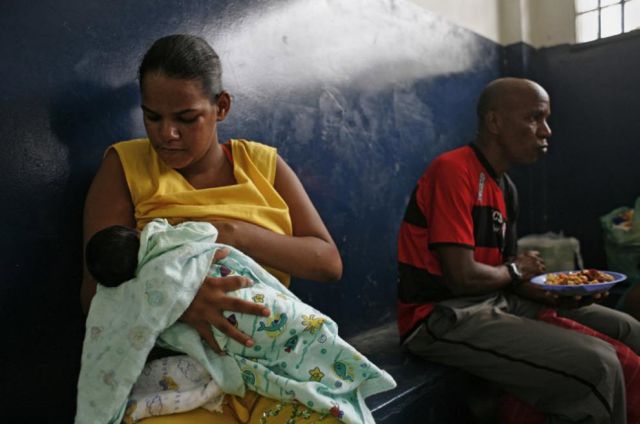
A mother waits to meet her son at a prison gate. Black poor children born in prison (or who have mothers in prison) are more likely to get involved in crime than those white, free and better off counterparts. The State in Brazil has the obligation to protect vulnerable children but rarely do so. At the end, grandmothers outside the prisons are, in fact, responsible for those left without assistance.

Rosangela, 33, and her 1 year old son Bruno. Rosangela was sent to prison for one year, eleven months and ten days convicted of international drug trafficking. Pedro was born in prison.
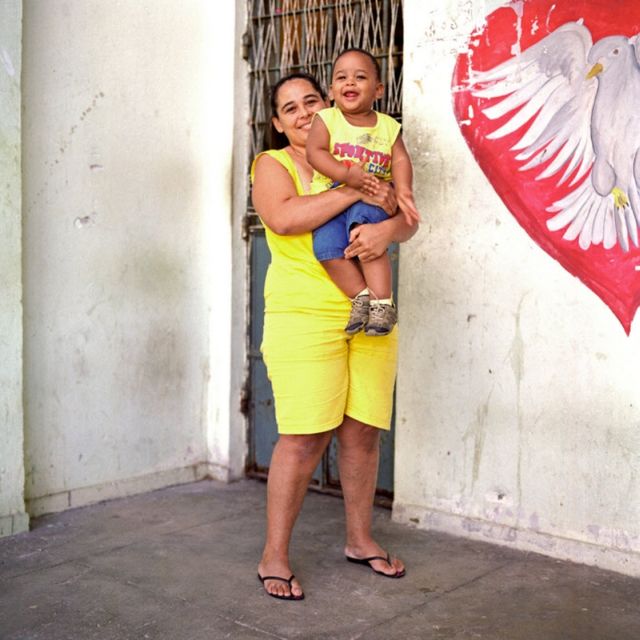
Pedro was born in prison. His mother Rosangela, 33, (on the left) was locked for international drug trafficking as she attempted to embark to Spain carrying cocaine. According to Brazilian law a child cannot stay in prison once completing two years of age but in many cases the detainees are abandoned by the family or are so poor that they can't afford childcare so the children have to live with them.
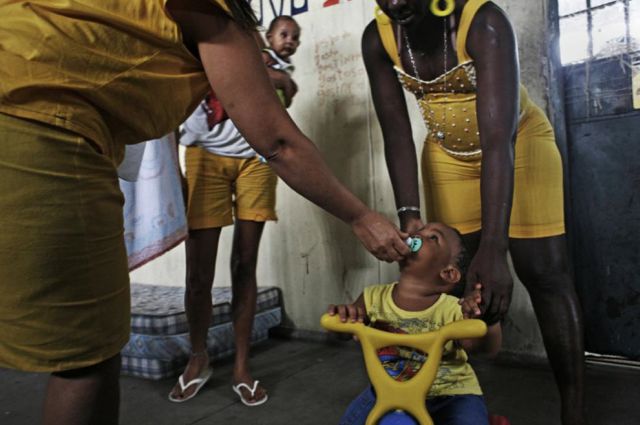
Inmates look after themselves (and other inmates' children) as long as internal disputes do not get on the way. Antonia Lucia, 29, is a crack cocaine addict - and my right hand on this assignment. She holds an inmates's baby.

No doubt prisons are tough places. It is also true that inmates find support and comfort amongst themselves as the State fails to assist them. Pregnant inmates are very vulnerable and cared for by other prisoners. Different from the general public's perception, the fact that some prisoners are guilty of horrible crimes, it does not mean they lack of friendship and compassion.

A prisoner has arrived one day prior my first day in the prison. On visit days she is kept locked in a small pavilion as she does not have friends or relatives in town. Some prisoners are from distant villages and relatives cannot afford to travel to the prison. Some others are simply abandoned.
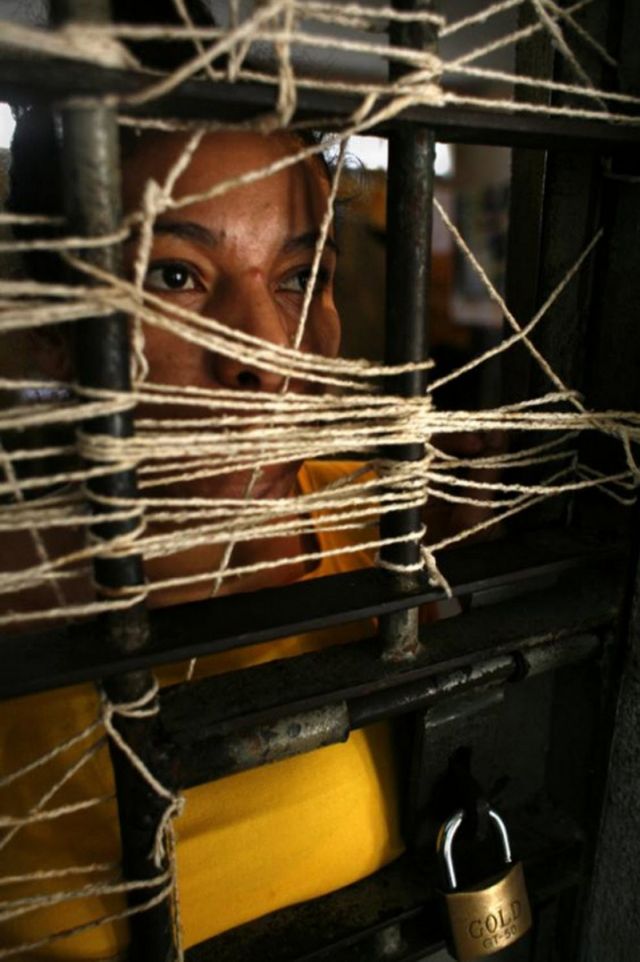
Suelen Santos Medeiros, a 23 years old spent one year in prison for drug trafficking and now waits to be sentenced for storming a local hairdresser and throwing acid on her boyfriend lover's face. She ended up injuring eight people - including herself. Wilames, her partner and also a drug dealer, was arrested on the same occasion for possession of a fire arm.
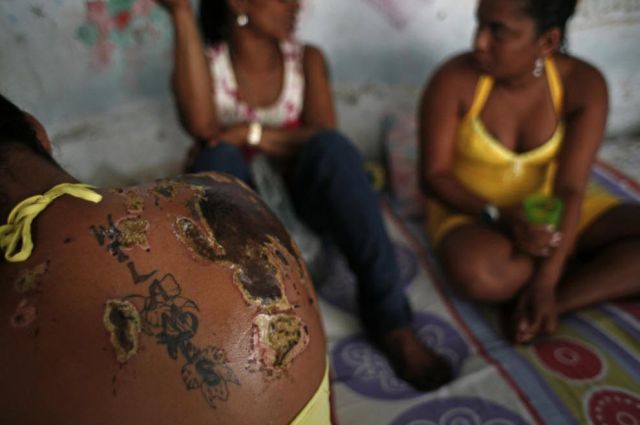
During my time in the prison the inmates wrote a letter to the prison's director to complain about the conditions in the prison as well as to demand the review of cases. Those accused of minor crimes, and waiting to be sentenced, live in the same cells as sentenced murders. Workshops were closed due political struggles at managerial level and the inmates complain of boredom as they spend the day doing noting but smoking weed or planing the next escape.

These items were confiscated by the warders during a number of searches in the cells. Amongst them there are sex toys, hand made weapons and mobile phones (kept hidden away in the inmates' vagina). Inmates complain that searches are carried violently by the police special forces in fully riot gear and balaclavas.
这是搜查出来的违禁品,有性玩具,手工武器,手机(藏在阴道里)

Sister Adele moved to Brazil from Milan/Italy in 1993. She quotes from the Bible '...I was in jail and you visited me...' to justify her work with the families in the prison in Bahia/Brazil. Brazilian judges ruled, in 1999, that children over the age of two could not leave in prison with their mothers. As the inmates did not trust the State they decided to trust their children in the hands of Sister Adele. Her mission then begun.

Sister Adele administers a creche near the prison and looks after those who are too old to stay in prison or are from extremely poor backgrounds. The children receive good education and live like a family. In return they must accept Catholicism as their religion.

Dona Maria de Fatima contracted HIV while injecting cocaine - an addiction she has left behind. She has a daughter in prison and looks after Diane (pictured), one of her granddaughters. Her other daughter is a crack cocaine addict and her son works in security on a minimum wage.
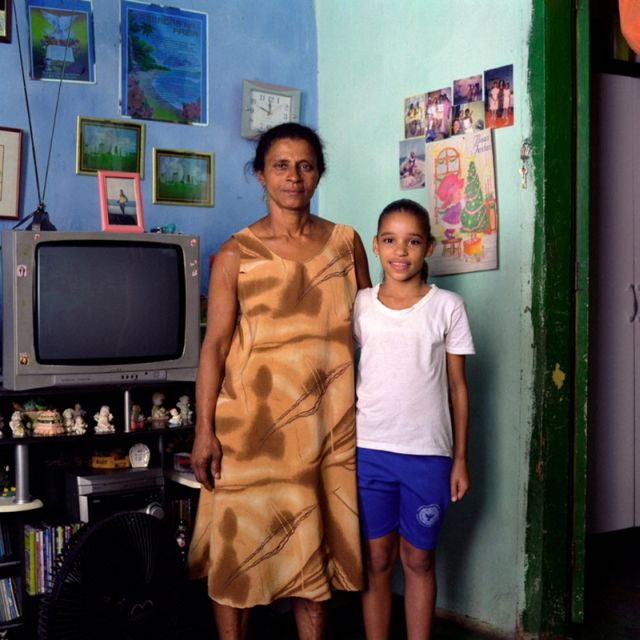
Dona Maria de Fatima, 48 years old, who contracted HIV while injecting cocaine, looks after her granddaughter Diane as her daughter is currently in prison. Although very poor and sharing accommodation with drug dealers, drug addicts and thieves, Dona Maria de Fatima sends Diane to school and ballet and flute classes. She invests her energies in braking the cycle of violence, imprisonment and poverty that surrounds her and her community. She gave up her addiction to cocaine altogether.

Suelen Santos Medeiros, who was sentenced for burning her boyfriend's lover with acid, appears on a television blood thirsty program. When that happens the community where she lives stops to watch. Crime is almost the only way for them to enjoy their '15 minutes of fame'.
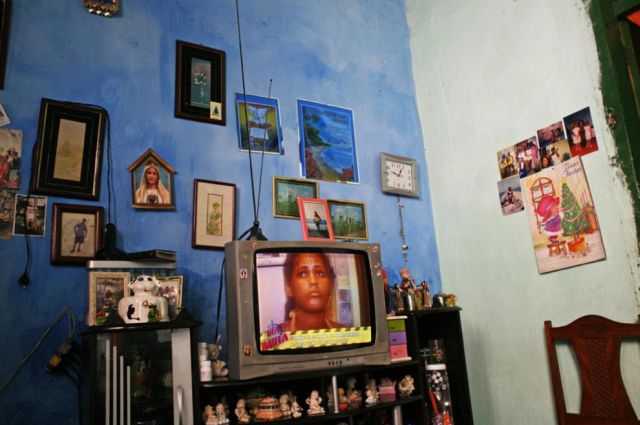
Dona Maria de Fatima's daughter (who did not want to reveal her name) is addicted to crack cocaine and has given birth to her seventh offspring. The only possessions the child has was given by the government as part of a program to assist extremely poor mothers who cannot afford the cost of maternity. The mothers must take part in pre-birth programs during pregnancy to receive the benefit. These programs aim to reduce levels of children (and mothers) mortality during labour. Her mother is HIV positive and her sister is currently imprisoned.
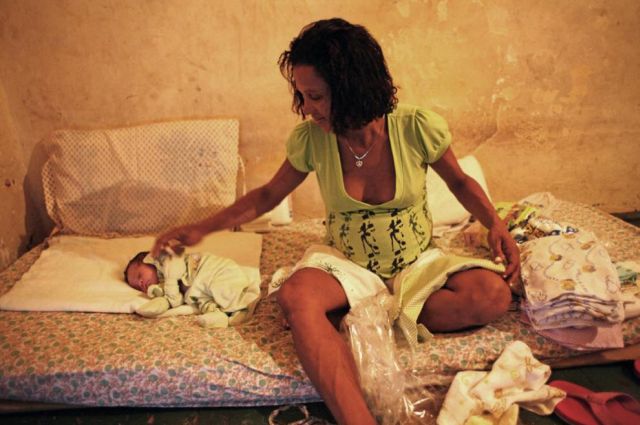
Those inmates in long-term relationship have the right to have intimate encounters but only if they agree on receiving a contraceptive injection. The rooms where the encounters occur are as basic to say the least.
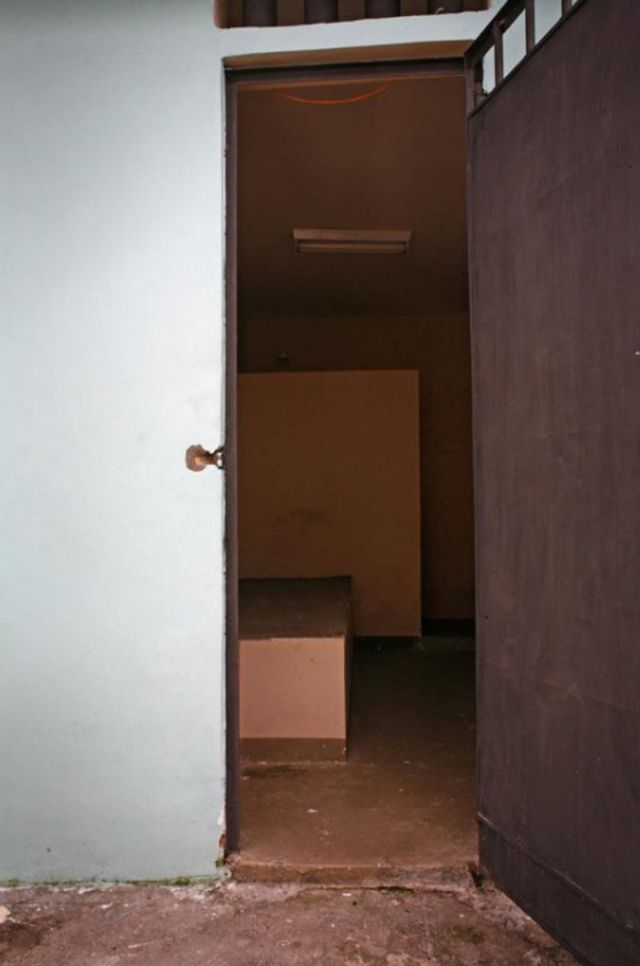
[Source]
巴西监狱中的女人们(21 pics + text)
网络中的女人们
会说话的眼睛(8 pics + text)
毛泽东诗词中的那些神秘女人们
乌克兰贵宾监狱(28 pics)
全球美丽女政客(21 pics)
巴基斯坦被酸液毁容的妇女们(12 pics + text)
格林斯潘生命中的女人们(图)
毛泽东诗词中的那些神秘女人们(珍贵照片)
写给情感纠葛中的男人女人们 - Qzone日志
毛泽东诗词中的那些神秘女人们( 照片)
性感女绝地 (25 pics)
巴西里约热内卢的警匪大战(52 pics)
巴西监狱大暴动:囚犯被肢解 脑瓜子横飞
黄沙中的悉尼 (53 pics)
墓地中的生活(19 pics)
夹缝中的生存(10 pics)
贫民窟中的分娩(12 pics)
《替夫讨薪的女人们 》
豁达 的女人们
脍炙人口的女人们
豁达 的女人们
中国的女人们
撒哈拉的女人们